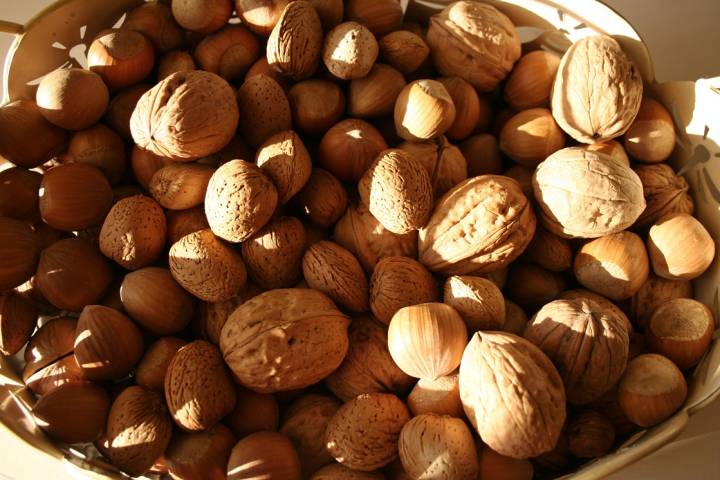The old adage that an apple a day keeps the doctor away is getting a tasty update. New research suggests that eating a handful of nuts lowers your risk of chronic diseases, such as heart disease, diabetes and cancer.

From pecans to almonds and walnuts, scientists out of Imperial College London say that about 20 grams of nuts per day — roughly a handful — cuts risk of plenty of diseases.
“In nutritional studies, so far much of the research has been on the big killers such as heart disease, stroke and cancer, but now we’re starting to see data for other diseases,” study co-author, Dr. Dagfinn Aune, said.
“We found a consistent reduction in risk across many different diseases, which is a strong indication that there is a real underlying relationship between nut consumption and different health outcomes. It’s quite a substantial effect for such a small amount of food,” Aune said.
READ MORE: Why Canadian scientists say you should add nuts to your daily diet
Aune’s team came to their conclusions after looking at 29 global studies and nearly 820,000 people. There were 12,000 cases of heart disease, 9,000 cases of stroke, 18,000 cases of heart disease and cancer and more than 85,000 deaths.
Across the board, people who ate nuts on a daily basis tended to have better health outcomes. Eating just a handful helped by:
- Cutting risk of heart disease by nearly 30 per cent compared to those who didn’t eat nuts
- Cutting risk of diabetes by nearly 40 per cent
- Cutting risk of cancer by 15 per cent
- Cutting risk of dying from respiratory disease by 50 per cent
- Cutting risk of premature death by 22 per cent

Get weekly health news
The scientists came to these findings even though there were differences in population, such as gender or living in different regions of the world.
The study zeroed in on all kinds of tree nuts including hazelnuts, walnuts and even peanuts, which are legumes.
READ MORE: Why are nuts good for you and how much should we eat?
So what is it about nuts? The researchers say it’s because they’re nutrition powerhouses. They’re high in fibre, magnesium, and healthy polyunsaturated fats, which help to fight heart disease and reduce cholesterol levels.
“Some nuts, particularly walnuts and pecan nuts are also high in antioxidants, which can fight oxidative stress and possibly reduce cancer risk. Even though nuts are quite high in fat, they are also high in fibre and protein, and there is some evidence that suggests nuts might actually reduce your risk of obesity over time,” Aune said.
Try not to eat too much, though. The study found that people who ate more than 20 grams per day didn’t see their health outcomes improve.
READ MORE: Why you should eat beans, lentils and peas to lower bad cholesterol
Aune’s full findings were published Sunday in the journal BMC Medicine. They aren’t the first to focus on the merits of eating nuts.
Last year, Canadian doctors at St. Michael’s Hospital said that eating tree nuts, including almonds, cashews, walnuts and pistachios, could help to lower triglycerides and blood sugars in your body.
A single serving a day — about 30 to 50 grams — is enough to reap the benefits, the study suggested.
“Nuts are certainly a complete food and need to be given their rightful place in a healthy diet. There is room for people to be able to increase their nut intake and take advantage of these benefits,” Dr. John Sievenpiper told Global News.
Nuts replace saturated fats, particularly from animal protein. It was across the board for all tree nuts, too: almonds, Brazil nuts, cashews, chestnuts, hazelnuts, pecans, macadamia nuts, walnuts, pine nuts and pistachios are examples.
“We didn’t see any increase in weight or belly fat…the calories that are labelled on tree nuts may not be the calories that you actually metabolize,” he explained.
carmen.chai@globalnews.ca
Follow @Carmen_Chai








Comments